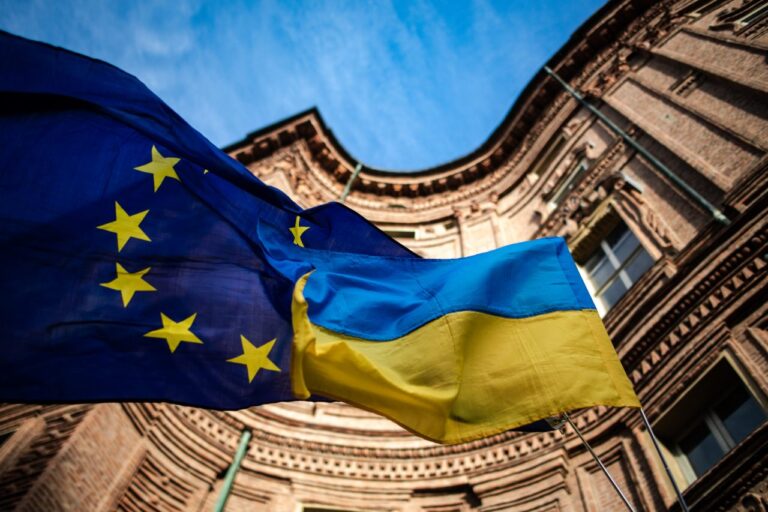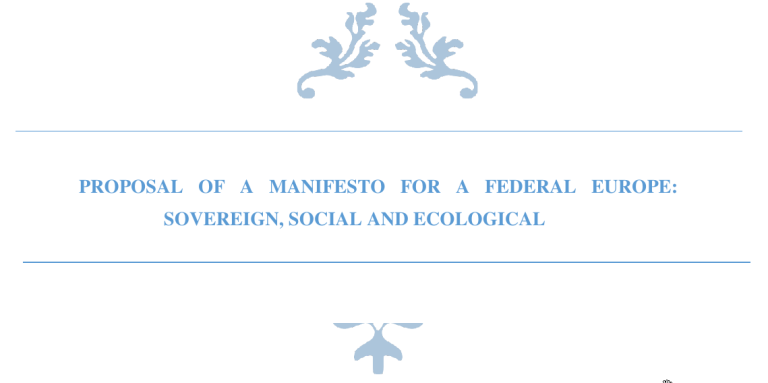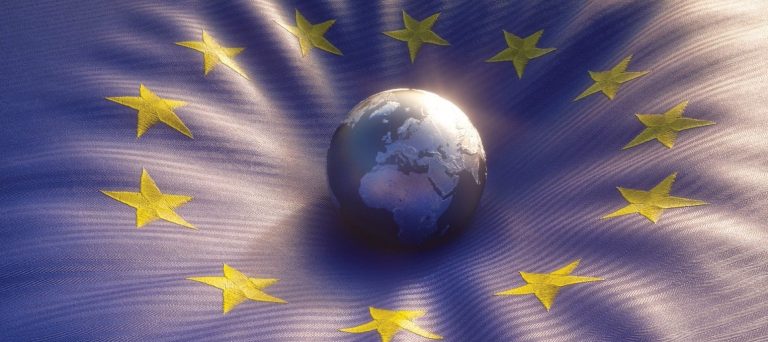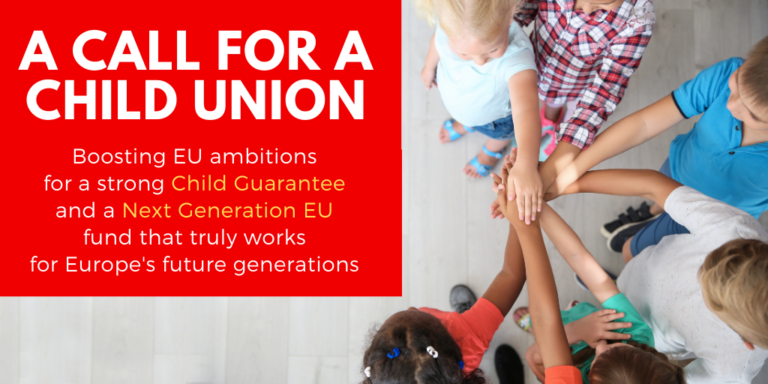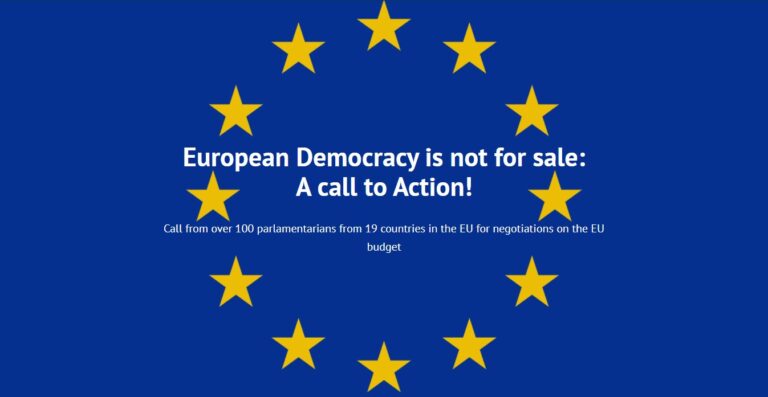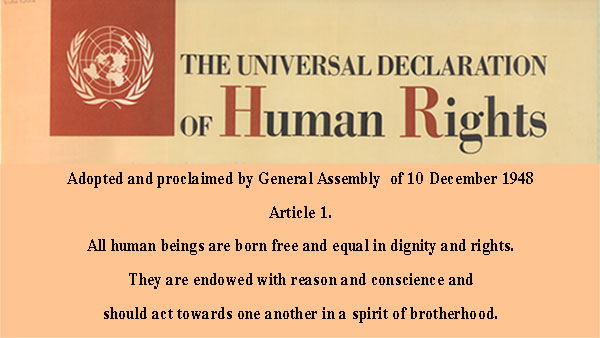For a strong Child Guarantee and a Next Generations EU fund for Europe’s future generations
Within the European Union, even before the pandemic, 23 million children were at risk of poverty and social exclusion. The financial difficulties endured by European families due to Covid-19 as well as the disruption in early childhood education and care (ECEC) services have further strained an already perilous situation.
That is why over 300 prominent figures from the world of politics, academia and civil society that have already signed this call.and invites you to join this call for a Child Union built on three objectives:
- A rapid entry into force of the European Child Guarantee
- The development of an investments ecosystem for European children starting with a correct planning of the Next Generation EU funding
- Guaranteed equal access to quality and inclusive early childhood education and care for all
You can sign this Call below and share the link with your network! The call is available in different languages on the website of PES group Committee of the Regions.
The Ventotene Lighthouse also invites you to sign this Call.
The Call
Within the borders of the European Union, already before the pandemic, 23 million children were at risk of poverty or social exclusion. The financial difficulties endured by European families in this period as well as the disruption in educational and care services have added additional strain to an already worrisome situation. The public health restrictions brought about by the pandemic have made it hard for many to keep up with their education, leading some to drop out of school altogether. The inability to socialise with their peers has impacted children’s mental health. The consequences have been very unequal depending on socio-economic background, even as poverty has worsened.
The impact of the pandemic on children’s inequalities is uneven and alarming. For this reason, we call for a renewed effort of European Institutions towards attaining a Child Union, a union that guarantees equal opportunities to all children, and a prompt action to deliver on the Child Guarantee and on a Next Generation EU that truly works for Europe’s next generations.
There are little doubts that the fragility of Europe is the result of increased inequalities and a protracted undermining of welfare, which have made our society more vulnerable to economic, environmental, and, as we have seen, health crises.
Our children are the key to building more just and sustainable societies. Overwhelming evidence shows that inequalities in life chances are already formed in the early years of life and are largely passed on through generations. At present, many families with young children are without adequate support, and only half of EU member states have reached the EU objective of a 33% coverage for early childhood education and care (ECEC) below the age of 3.
The figures that EUROSTAT provides would be worrying even without the COVID-19 effect. In 9 countries, less than 1 out of 5 children enjoys childcare, and that is usually the one from a better off household. It is in fact worrisome that the take up of ECEC services is much lower among children from disadvantaged families, children with special needs, low income households and people living in rural and remote areas.
The figures that EUROSTAT provides would be worrying even without the COVID-19 effect. In 9 countries, less than 1 out of 5 children enjoys childcare, and that is usually the one from a better off household. It is in fact worrisome that the take up of ECEC services is much lower among children from disadvantaged families, children with special needs, low income households and people living in rural and remote areas.
In some countries less than 20% of these children are part of any kind of ECEC, compared to more than 70% among the top income households. A study led by FEPS and partners finds that European 0 to 3 years old children from the bottom 40% socio-economic status are about 15% more likely to attain average scores once teenagers, if they have access to childcare at the age of 1 or 2. The study highlights that welfare provisions do impact children’s later education outcomes, whereas for instance where women’s employment rate are above the EU average and where both parents are eligible for parental leave, children from disadvantaged households can more easily achieve good educational results.
This indicates that unless we provide quality and inclusive services, care and education in early years in Europe remains a means for children from better off households to achieve their best potential rather than a means to reduce inequalities and eradicate social exclusion.
As progressives, we demand a systemic transformation: the end of ECEC as demand-driven service and the beginning of an era where it is an entitlement for every child. A legal and social right enshrined in European law, building on the European Pillar of Social Rights.
The EU possesses the capacity for policy innovation and the political strength to facilitate a new era of support and development for all European children and to address such very stubborn trends of inequality. To this end, as progressive leaders, scholars and activists from across Europe, our vision for a Child Union is grounded on the following objectives:
1. A rapid entry into force of the European Child Guarantee.
Many members of the European Parliament and the whole progressive family have called for a European Child Guarantee to tackle the multidimensional aspects of child poverty.
The Child Guarantee would ensure that every European child in or at risk of poverty has access to quality and free early childcare, along with health care, education, decent housing, and adequate nutrition. Negotiations are ongoing and all efforts must be made to ensure that the Child Guarantee becomes an integral part of EU policy. This includes a dedicated budget of 20 billion Euros and binding financing commitments for the Member States in their ESF+ national programmes.
2. Develop an investments ecosystem for European children starting with a correct planning of the Next Generation EU funding.
With children bearing the brunt of so much of the pandemic’s blows, the Child Union should become a fundamental pillar in Europe’s recovery strategy. This requires re-calibrating National Recovery Plans towards the care services of Europe’s future generations.
An investment ecosystem for European children should build on the Child Guarantee, the Recovery and Resilience Facility, Structural Funds and national resources to enhance the effective delivery of quality and inclusive ECEC services for all, with a special focus on the most vulnerable children and families.
3. Guarantee equal access to quality and inclusive early childhood education and care for all.
European law should ensure child rights and legal entitlements with universal and affordable public provisions for all and dedicated resources for disadvantaged and at-risk children. Promoting quality and inclusiveness are key priorities. This involves: i) providing teachers with decent salaries and training to equip Europe’s next generation with the 21st century skills they need to succeed; ii) strengthening children’s emancipation and their role as agents of change; iii) facilitating the involvement and participation of parents and communities; iv) capitalizing on the synergies that ECEC has with social protection and labour policies. In fact, to tackle structural inequalities as risk factors for children’s development, income support measures for children, active labour market policies, particularly for female employment; decent minimum wages guaranteed by law or collective bargaining, and adequate gender-neutral parental leaves are decisive.
The COVID-19 pandemic has posed new and dramatic challenges to vulnerable households. As experts, activists and policymakers we think that it is time to raise Europe’s ambitions and put forward this strong call for a Child Union. This expresses the demand to the EU to raise to the expectations of its citizens and ensure wellbeing not only through Banking Union, Capital Markets Union, Energy Union and other economic cooperation, but through a Social Union that has a strong mandate on the wellbeing of every child.
EUROPEAN POLICYMAKERS
Brando Benifei, Member of the European Parliament, Rapporteur on the European Child Guarantee and President of the Spinelli Group
Agnes Jongerius, Member of the European Parliament, Chair of the PES Social Europe Network
Victor Negrescu, Member of the European Parliament, Rapporteur on the EU digital education strategy
Marc Tarabella, Member of the European Parliament and Mayor of Anthisnes
Sergei Stanishev, President of the Party of European Socialists
Iratxe Garcia Perez, President of the S&D Group and Member of the European Parliament
Zita Gurmai, Member of the Hungarian Parliament and President of PES Women
Christophe Rouillon, President of the PES Group in the European Committee of the Regions, Vice-President of the Association of French Mayors and Mayor of Coulaines
Maria João Rodrigues, President of FEPS and Chair of the PES Economic and Financial Network
László Andor, Secretary General of FEPS and former European Commissioner for Employment, Social Affairs and Inclusiveness
Klára Dorev, Vice President of the European Parliament, S&D Group
Alicia Homs, Member of the European Parliament and President of the Young European Socialists
Margarida Marques, Member of the European Parliament
Udo Bullmann, Member of the European Parliament
Elisabetta Gualmini, Member of the European Parliament
Estrella Dura Ferrandis, Member of the European Parliament
Massimiliano Smeriglio, Member of the European Parliament
Tonino Picula, Member of the European Parliament
Pau Mari Klose, Member of the Spanish Parliament
Sylvie Guillaume, Member of the European Parliament
Ibán García del Blanco, Member of the European Parliament
Josianne Cutajar, Member of the European Parliament
Rovana Plumb, Member of the European Parliament
Aurore Lalucq, Member of the European Parliament
Carmen Gabriela Avram, Member of the European Parliament
Csaba Molnár, Member of the European Parliament
Sándor Rónai, Member of the European Parliament
Attila Ara-Kovács, Member of the European Parliament
Isabel Carvalhais, Member of the European Parliament
Vilija Blinkevičiūtė, Member of the European Parliament
Tanja Fajon, Member of the European Parliament
Eva Kaili, Member of the European Parliament
Monika Beňová, Member of European Parliament and Quaestor
Juozas Olekas, Member of the European Parliament
Cyrus Engerer, Member of the European Parliament
Costas Mavrides, Member of the European Parliament
Isabel Carvalhais, Member of the European Parliament
Isabel Coelho Santos, Member of the European Parliament
Pedro Marques, Member of the European Parliament
Javier Moreno Sánchez, Member of the European Parliament
Paul Tang, Member of the European Parliament
István Ujhelyi, Member of the European Parliament
Alex Agius Saliba, Member of the European Parliament
Domènec Ruiz Devesa, Member of the European Parliament
Mohammed Chahim, Member of the European Parliament
Patrizia Toia, Member of the European Parliament
Alessandra Moretti, Member of the European Parliament
Pina Picierno, Member of the European Parliament
Heléne Fritzon, Member of the European Parliament
Caterina Chinnici, Member of the European Parliament
Tsvetelina Penkova, Member of the European Parliament
Romana Jerković, Member of the European Parliament
Clara Aguilera, Member of the European Parliament
César Luena, Member of the European Parliament
Javi López, Member of the European Parliament
Nora Mebarek, Member of the European Parliament
Gabriele Bischoff, Member of the European Parliament
Miapetra Kumpula-Natri, Member of the European Parliament
Adriana Maldonado, Member of the European Parliament
Carlos Zorrinho,Member of the European Parliament
Evelyn Regner, Member of the European Parliament
Predrag Fred Matić, Member of the European Parliament
Csaba Molnár, Member of the European Parliament
Bettina Vollath, Member of the European Parliament
Adrian-Dragos Benea, Member of the European Parliament
Manuel Pizarro, Member of the European Parliament
Biljana Borzan, Member of the European Parliament
Demetris Papadakis, Member of the European Parliament
Nils Usakovs, Member of the European Parliament
Andreas Schieder, Member of the European Parliament
Petra Kammerevert, Member of the European Parliament
Milan Brglez, Member of the European Parliament
Ismail Ertug, Member of the European Parliament
Mònica Silvana González, Member of the European Parliament
Cristina Maestre, Member of the European Parliament
Isabel Garcia Munoz, Member of the European Parliament
Maria-Manuel Leitão-Marques, Member of the European Parliament
Miroslav Číž, Member of the European Parliament
Eric Andrieu, Member of the European Parliament
Hannes Heide, Member of the European Parliament
Roby Biwer, Vice President, European Committee of the Regions and Member of Bettembourg Municipal Council
Enrique Barón Crespo, President of FEPS Scientific Council and former President of the European Parliament
Ana Pirtskhalava, Secretary General of the Young European Socialists
Elisha Winckel, Vice President of the Young European Socialists
Sara Costa, Vice President of the Young European Socialists
Chiara Malagodi, Deputy Secretary-General, PES Group in the European Committee of the Regions
Christina Schauer, President, International Falcon Movement – Socialist Educational International (IFM-SEI)
Ellen Lindsey Awuku, Vice President, IFM-SEI
Jasmin Trogen, Presidium member, IFM-SEI
Ruba Hilal, Secretary-General, International Falcon Movement – Socialist Educational International (IFM-SEI)
NATIONAL POLICYMAKERS
Marie-Louise Coleiro Preca, Former President of Malta and President Eurochild
Concepción Andreu Rodríguez, President of La Rioja Region and Vice President of the PES Group in the European Committee of the Regions
Elio Di Rupo, Minister-President of Wallonia and Member of the European Committee of the Regions
Rudi Vervoort, Minister-President of the Brussels-Capital Region and Member of the European Committee of the Regions
Paul Magnette, President of the Belgian Parti Socialiste and Mayor of Charleroi
Karl-Heinz Lambertz, President of the Parliament of the German-Speaking Community of Belgium and Member of the European Committee of the Regions
Sandra Zampa, Undersecretary of State, Italian Ministry of Health
Pascal Smet, Secretary of State of the Brussels-Capital Region, responsible for Urbanism and Heritage, European and International Relations, Foreign Trade and Fire fighting and Emergency medical Assistance, Government of the Brussels Capital Region and Member of the European Committee of the Regions
Celso González, Regional Minister for Finance and Public Administrations, Government of La Rioja and Member of the European Committee of the Regions
Fernando Medina, Mayor of Lisbon and Member of the European Committee of the Regions
Juan Espadas Cejas, Mayor of Sevilla and Member of the European Committee of the Regions
Rachid Madrane, Président du Parlement de la Région de Bruxelles-Capitale
Antonio Mazzeo, President, Regional Council of Tuscany
Virginio Merola, Mayor of Bologna and Member of the European Committee of the Regions
Kata Tüttő, Deputy Mayor of Budapest and Member of the European Committee of the Regions
Arianna Censi, Deputy Mayor of the Metropolitan City of Milan and Member of the European Committee of the Regions
Karin Wanngård, Opposition Vice Mayor of Stockholm and Member of the European Committee of the Regions
Elke Decruynaere, Deputy Mayor, City of Ghent
Luca Vecchi, Mayor of Reggio Emilia
Jelena Pavicic Vukicevic, Deputy Mayor, City of Zagreb and Member of the European Committee of the Regions
Lambelin Anne, Vice Présidente du Parti socialiste belge, PS
Tom Jungen, Secretary general, Luxembourg Socialist Workers’ Party – LSAP and Member of the European Committee of the Regions, and Mayor of Roeser
Jaume Bartumeu, Former Prime Minister of Andorra
Agustin Zamarron Moreno, Member of the Spanish Parliament
Santos Cerdán León, Member of the Spanish Parliament, Secretary for Territorial Coordination and Government Relation for the PSOE and President of the Pablo Iglesias Foundation
Carmen Gayo, Director, Oficina Alto Comisionado para la lucha contra la pobreza infantil
Jernej Pikalo, former Minister of Education of Slovenia
Martina Vuk, former State Secretary, Slovenian Ministry of Labour, Family, Social Affairs, Equal Opportunities
Lajos Korvìzs, Member of Hungarian Parliament and Chairman of the Social Committee
Tamas Harangozo, Member of Hungarian Parliament, First Deputy Parliamentary Group Leader MSZP
Sandor Szabo, Member of Hungarian Parliament
Ildikó Bangóné Borbély, Member of the Parliament, Hungarian Socialist Party MSZP
Tommaso Nannicini, Senator and Professor at Bocconi University
Lia Quartapelle, Member of the Italian Parliament
Kimmo Kiljunen, Member of the Finnish Parliament
Katia Segers, Senator of the Belgian Senate and Member of the Flemish Parliament
Tero Shemeikka, International Secretary, Finnish Social Democratic Party, SDP
Anne Karjalainen, Member of the Kerava City Council, Member of the European Committee of the Regions the Chair of the Commission for Social Policy, Education, Employment and Culture (SEDEC)
Gustav A. Horn, Member of the Federal Executive Board of the SPD, SPD and FEPS Scientific Advisory Council
Cecilia Gondard, Secretary National in charge of gender Equality, Parti Socialiste
Miguel Carneiro, Mayor of Vila Boa do Bispo
Silvia Costa, Italian Government extraordinary appointed for Ventotene, former MEP
Christine Jung, City Councillor of Saarbrücken
Luca Menesini, President of the Province of Lucca, Mayor of Capannori and Member of the European Committee of the Regions
Raffaella Curioni, City Councillor for Schooling and Education, Municipality of Reggio Emilia
Alessandra Medici, Local Councillor, Municipality of Guastalla
Paul Sarrugia, President, South East Region of Malta
Aoife Breslin, Councillor, Labour Party of Ireland, and Member of the European Committee of the Regions
Enzo Bianco, Local Councillor of Catania and Member of the European Committee of the Regions
Heijo Höfer, Member of the Parliament, Landtag Rheinland-Pfalz, and Member of the European Committee of the Regions
Vojko Obersnel, Mayor of Rijeka and Member of the European Committee of the Regions
Krzysztof Matyjaszczyk, Mayor of the City of Częstochowa and Member of the European Committee of the Regions
Vladimir Prebilič, Mayor of Kočevje Municipality and Member of the European Committee of the Regions
Bayet Hughes, Mayor of Farciennes and Member of the European Committee of the Regions
Javier Vila Ferrero, Director General of European Affairs, Government of Principality of Asturias
Manuela Bora, Member of the Regional Assembly, Marche Region
Reiner Zimmer, Member of the Parliament,SPD Fraktion im saarländischen Landtag
Marika Saar, Deputy Mayor of Elva municipality
Yoomi Renström, Mayor of Ovanåker and Member of the European Committee of the Regions
Alison Gilliland, Chairperson Strategic Policy Committee for Housing, Dublin City Council, and Member of the European Committee of the Regions
Jens Christian, Council member of Haderslev Municipality and Member of the European Committee of the Regions
Mikko Aaltonen, Councilor of City of Tampere and Member of the European Committee of the Regions
Dimitrios Birmpas, Member of Municipal Council, Municipality of Egaleo and Member of the European Committee of the Regions
Guido Milana, Local Councillor of Olevano Romano and Member of the European Committee of the Regions
Isolde Ries, Vice-President of the Saarland State Parliament, Vice-President of the European Committee of the Regions
Alessandra Medici, Local Councillor of Guastalla
Othmane Yassine, Local Councillor of Fermignano
Lieve De Bosscher, Director, Childcare Services City of Ghent
Niklas Kossow, Member, SPD Friedrichshain-Kreuzberg
Edit Herczog, Member of the supervisory board, MSZP
Ilmar Reepalu, Chair of Swedish Association of Local Authorities and Regions and Member of the European Committee of the Regions
Guido Rink, Vice Mayor of the municipality of Emmen and Member of the European Committee of the Regions
Filip Reinhag, Local Assembly, Gotland Region and Member of the European Committee of the Regions
Per Bødker Andersen, Councillor of Kolding Municipality and Member of the European Committee of the Regions
Samuel Gonzalez Westling, Vice Chairman of Hofors Municipality and Member of the European Committee of the Regions
Pablo Rubio Medrano, Consejero Servicios Sociales y Gobernanza Pública, Government of La Rioja
Jakub Michał Kwaśny, Head of Tarnów City Council and Alternate Member of the European Committee of the Regions
Stavros Stavrinides, Municipal Councilor of Strovolos and Member of the European Committee of the Regions
Jácint Horváth, Member of the local government, Nagykanizsa Municipality and Member of the European Committee of the Regions
Mikkel Näkkäläjärvi, Member of the City Council, City of Rovaniemi and Member of the European Committee of the Regions
Stephan Durviaux, Cabinet Director, Presidency of the Parlement de la Région de Bruxelles-Capitale
Chantal Jacquemart, Emploi, Stratégie 2030, Formation, Cabinet of the Minister-President of the Brussels-Capital Region
Albert Arcarons, Adviser to the Spanish High Commissioner against Child Poverty
Mariana Radu, Head of Division, Romanian Ministry of Justice
Mehnaz Aziz, Member of the National Assembly, National Parliament of Pakistan
CIVIL SOCIETY
Alfredo Sánchez-Monteseirín, Director, Pablo Iglesias Foundation and former Mayor of Sevilla
Mojca Kleva Kekuš, President of Društvo Progresiva
Liina Carr, Confederal Secretary, European Trade Union Confederation (ETUC)
Mikael Leyi, Secretary General, SOLIDAR Foundation
Jan Willem Goudriaan, General Secretary, European Public Services Unions (EPSU)
Jesús Gallego, Confederal Secretary for International Policy of UGT Spain
Domenico Proietti, Confederal Secretary, Unione Italiana del Lavoro (UIL)
Jana Hainsworth, Secretary General, Eurochild
Thomas Jansen, Secretary General h.c., International European Movement
Leonie Martin, President, Young European Federalists (JEF)
Gabor Harangozo, Director, Institute for Social Democracy
Fernando Savater, Philosopher
Fabrizio Barca, Coordinator, Forum Disuguaglianze e Diversità & former Minister for territorial cohesion
Enrico Giovannini, Director Italian Alliance for Sustainable Development – ASviS
Christophe Leclercq, Executive Chairman Europe’s MediaLab and Founder of Euractiv Media Network
Cristian Fabbi, President at Istituzione Nidi e Scuole dell’Infanzia del Comune di Reggio Emilia and Senior Expert on early childhood education and care, UNESCO
Elizabeth Gosme, Director, COFACE Family Europe
Chiara Piccolo, Brussels’ Representative, Alliance for Childhood European Network Group
Réka Tunyogi, Head of Advocacy, Eurochild
Chiara Saraceno, Co-coordinator, Alleanza per l’Infanzia
Claudia Giudici, President, Reggio Children Srl
Guillaume Klossa, Founder of EuropaNova & Civico Europa
Mathijs Euwema, Director, International Child Development Initiatives (ICDI)
Kaisa Vatanen, Director, Kalevi Sorsa Foundation
Fabio Porcelli, Chief officer, UIL
Jackie Jones, Former MEP, Wales Assembly of Women
Benoit Van Keirsbilck, Director, Defence for Children international Belgium
Chahida Bufraquech, Education Officer, UNICEF Belgium
Szűcs Viktória, President, Hungarian Democratic Union of Nursery Workers (BDDSZ)
Anastasia Papaprokopiou, Scientific Coordinator, Society for the Development and Creative Occupation of Children (EADAP)
Yakarah Attias-Rosen, Managing Director, Learning for Well-being Foundation
Martin Seeleib-Kaiser, Chairman, Jusos Brüssel
Eric Bloemkolk, Director, SOFT tulip Foundation
Flora Bolter, Co-director Observatoire LGBT+, Fondation Jean Jaurès
Carolien De Groot, Directeur-bestuurder, Stichting Jeugd en Samenleving Rijnland
Rebecca Riess, Director, Le Furet Petite Enfance
Ulviyya Mikayilova, Executive Director, Center for Innovations in Education
Antonio Gaudioso, Secretary General, Cittadinanzattiva
Gwendolyn Burchell, Director, United Aid for Azerbaijan
Daiga Zaķe, Director, Center for Education Initiatives
Flavio Brugnoli, Director, Centro Studi sul Federalismo
Anna Colombo, Political adviser, S&D Group
David Rinaldi, Director of Studies & Policy, FEPS and Lecturer, ULB- Institute for European Studies
Liana Ghent, Director, International Step by Step Association (ISSA)
Denise Deshaies, President, Neohumanist Education Association
Giorgio Tamburlini, President and CEO, Centro per la Salute del Bambino
Uroš Jauševec, Secretary General, Društvo Progresiva
Michal Rybacki, Policy Officer, Young European Federalists (JEF Europe)
Odile Harvey Mear, EU Correspondant, Radio Nord Bretagne – Radio Pays de Leon
Francisco Lontro, President, Ludotempo – Associação de Promoção do Brincar
Stephen Lintott, Group coordinator, Evergreen Elfins, Cambridge Woodcraft Folk
Hugo Alexandre de Araújo, International Cooperation Officer, Instituto de Apoio à Criança
Klervi Kerneïs, Research assistant, Jacques Delors Institute
Azra Vrevic, Teacher, Elementary school
Lien Pattyn, Teacher, Artevelde Hogeschool
Eric Battier, Mandataire, DIDR38
Helga Ramirez, Presidente, Association USDLI
Valentina Bezzi, Regional Director, East West Consulting
Iris Skrt, Member, Progresiva Slovenija
Admira Hrelja, Social worker, Primary School Hasan Kikić
Danica Mojić, Pedagogist, Kindergarten
Nedim Krajišnik, Deputy Director, Center for educational initiatives Step by Step
Carmen Lică, Executive Director, Step by Step Center for Education & Professional Development, Romania
Cornelia Cincilei, Director, Step by Step Moldova
Mihaela Ionescu, Program Director, International Step by Step Association (ISSA)
Agata D’Addato, Senior Project Manager, Eurochild
Serena Foracchia, European policy officer, Reggio Children
Gabriela Jorquera Rojas, Technical Advisor, Spanish High Commissioner against Child Poverty
Elisabeth Helander, Finnish Member of the Bureau of AIACE International
Boros Vilma, Fellow, Institute for Social Democracy
Olesya Kravchuk, Communications Officer, International Step by Step Association (ISSA)
Teresa Moreno, Communications Officer, International Step by Step Association (ISSA)
Konstantina Rentzou, Senior Program Manager, International Step by Step Association (ISSA)
Francesca Colombo, Senior Program Officer, International Step by Step Association (ISSA)
Almudena Hernandez Raboso, CEO, Clinica Podologica Hernandez
Karleen De Rijcke, Coordinator, Kras vzw (Poverty Network Gent)
Anke van Keulen, Director, Bureau MUTANT
Matthieu Hornung, Member of the French PS and German SPD
Anna Kun, Member of MSZP
Katerina Nanou, Senior Advocacy Advisor, Child Poverty & Children in Alternative Care, Save the Children
Juhászné Katalin, MSZP
Ildikó Lendvai, MSZP
Katalin Devanszki, Hungarian Socialist Party
Nijole Dirginciene, Birstono savivaldybė, Savivaldybes meras
Francesca Petrucci, Project manager, Associazione 21 Luglio
Ålvaro Ferrer Blanco, Advocacy Advisor, Educational Equity, Save the Children Spain
Michele Fiorillo, Civic Network Coordinator, CIVICO Europa
Giulia Contes, Delegue thématique, FBJS
Leonor Rodrigues, Researcher, ProChild CoLAB
Joyce Koeman, Diversity policy officer, KU Leuven
Euléane Omez, Project officer for socio-economic policies, FEPS
Borbála Kajtárné Botár, MSZP Országos Pedagógus Tagoza
Giulia Loffredi, Parliamentary Assistant, Italian Chamber of Deputies
Eero Vuohula, Finnish activist and former EU official
Angelika Striedinger, Project Manager, Renner Institut
Ana del Barrio Saiz, Trainer-advisor Diversity & Inclusion, Ana del Barrio Training & Consulting
Matevz Marc, Manager, ProcyonStar
Deborah McCahon, Chief Executive Officer, Woodcraft Folk
Maria Rosa Cremonesi, Principal, MIUR
Maria Iacono, early childhood educator, Voghera
Szeredi Péter, SZDI
Pádár Lászlóné, Tag, MSZP
Lieve Baert, Eversberg, Erembodegem
Isabel Sanchez, Trainee, European Parliament
Peter Kiss, MA student, Leiden University
Adela Dobrić, Kindergarten teacher, JU Obdanište Travnik
Vera Valsecchi, Communication, A.A.G Stucchi
Luís Guimarães, Student, ISCSP
Judit Rusznákné, Activist
Marco Rantino, Studio Tecnico Rantino
Flavio Antei, Senior Sales Specialist, American Express
Borbála Kajtárné Botár, former teacher
Valentina Del Frate, Teacher, Italian Department for Education
ACADEMIA
Maria Herczog, Institute for Human Services (Columbus, Ohio), Lecturer at Eötvös Loránd University and Director of the Family Child Youth Association (Hungary)
Mathias Urban, Desmond Chair of Early Childhood Education, Dublin City University
Vivien Schmidt, Jean Monnet Professor of European Integration, Boston University
Anton Henerijck, Professor, European University Institute
Alberto Alemanno, Jean Monnet Professor of EU Law, HEC Paris & Founder, The Good Lobby
Fabio Masini, Jean Monnet Chair on History of European Economic Governance, Università Roma Tre
Bea Cantillon, Professor, University of Antwerp, Centre for Social Policy Herman Deleeck
Christian Morabito, Senior Researcher, Save The Children Italia
Michel Vandenbroeck, Professor, University of Ghent
Elsa Fornero, Honorary Professor, University of Turin & former Minister of Labour and Social Policies
Maurizio Ferrera, Professor, University of Milan
Kalypso Nicolaïdis, Professor of International Relations, University of Oxford
Antonio Padoa Schioppa, Emeritus Professor, University of Milan
Amandine Crespy, Professor, Université Libre de Bruxelles
Sofia Fernandes, Senior research fellow, Jacques Delors Institute
Roberto Castaldi, Director at CesUE and Associate Professor, eCampus University
Marga Marí Klose, Associate Professor, University of Barcelona
Sofie De Backer, Head of BA of Early Childhood Education, Artevelde University of Applied Sciences Ghent
Francesco Corti, Researcher, University of Milan and CEPS
Emilie Carosin, Researcher, University of Mons
Robin Huguenot-Noël, Doctoral Researcher, European University Institute
Yekaterina Chzhen, Assistant Professor, Trinity College Dublin
Geraldijne French, Head of the School of Language, Literacy and Early Childhood Education, Dublin City University
Maeve O’Brien, Professor of Human Development, Dublin City University
Jennifer Guevara, Rising Talent Fellow, Early Childhood Research Centre, Dublin City University
Laura Gormley, Assistant Professor, Dublin City University
Claudio Cressati, Professor University of Udine and President of Informest
Emanuele Pavolini, Professor, Macerata University
Susanna Cafaro, Professor, Università del Salento
Guido Montani, Professor of International Political Economy, University of Pavia
Lara Navarro, Senior researcher, Barcelona Institute of Regional and Metropolitan Studies
Magnus Skjöld, Associate Professor, Bifröst University
Mario Telò, Professor, Université Libre de Bruxelles
Adriano Prosperi, Emeritus Professor of Modern History, Scuola Normale Superiore
Alessandro Rosina, Professor, Università Cattolica di Milano
Antonio López-Pina, Professor of Constitutional & European Law, Universidad Complutense de Madrid
Juan Manuel de Faramiñán Gilbert, Professor of International Law, University of Jaén
Giuliana Laschi, Professor, University of Bologna
Gino Roncaglia, Professor, Roma Tre University
Laura Leonardi, Professor, University of Florence
Stefano Amedeo, Professor, University of Trieste
Paroula Naskou-Perraki, Professor, University of Macedonia
Ludmila Petrashko, Professor, Kyiv National Economic University
Gurutz Jauregui, Emeritus Professor, University of the Basque Country
Federico Belotti, Associate Professor, University of Rome Tor Vergata
Ilze Plavgo, Research Associate, European University Institute
Veronica Donoso, Researcher, KU Leuven
Carmen Benavides, Professor, Universidad de Oviedo
Claudia Morini, Senior Researcher on EU law, University of Salento
Giovanni Trovato, Professor of Statistics and Economics, University of Rome Tor Vergata
Piero Graglia, Professor of History of European Integration, University of Milan
Ivana Borić, Associate Professor, University of Zagreb
Giuseppe Inturri, Professor, University of Catania
Mehmet Toran, Associate Professor, Istanbul Kultur University
Sara Lembrechts, PhD researcher, Ghent University
Idesbald Nicaise, Professor emeritus, KU Leuven
Tuba Bircan, Assistant Professor & Research Coordinator for Interface Demography, Free University of Brussels (VUB)
Eva Vens, Lecturer, HOGENT, University of Applied Sciences and Art
Margaret Kernan, Senior Programme Manager, International Child Development Initiatives
Gökhan Kayılı, Associate Professor, Selcuk University
Caroline Loscher, School Support Coordinator, Primary Department, DCU Institute of Education
Ine Hostyn, Researcher, Artevelde University College
Brecht Peleman, Researcher, Ghent University, VBJK Centre for Innovation in the Early Years
Ahmet Simsar, Assistant Professor, Aralik Üniversitesi
Benedicte Vanblaere, Researcher and lecturer, Artevelde University of Applied Sciences
Valerie Mcloughlin, Administrator, EDC, Dublin City University
Graziano Pini, Responsible CRISE, Università degli Studi di Modena e Reggio Emilia (Unimore)
Antonia Pup, West University of Timișoara
Laura Anton, Public relations specialist, Spiru Haret University
Manuel Sarmento, Professor, University of Minho
Natália Fernandes, Lecturer, University of Minho
Kathy Uvin, lecturer, Arteveldehogeschool
Isabel Soares Professor, University of Minho, School of Psychology
Caroline Detavernier, Director Expertise Network People and Society, Artevelde University of Applied Sciences
Dusan Sidjanski, Professeur Émérite, Membre du Comité de direction, Centre de Compétences Dusan Sidjanski en Etudes Européennes, Université de Genève
Ilse Gentier, Lecturer, Arteveldehogeschool Gent
Joao Pinto, PhD Candidate, University of Minho
Emre Gömec, PhD candidate, University of Kassel
Ana Sani, Associate Professor, Universidade Fernando Pessoa
Goedroen Juchtmans, Senior Researcher Education and Labour Market, KULeuven-HIVA
Rasson Anne-Catherine, Maître de conférences & Researcher, Université de Namur
Anne Sénécal, Department of Methodology and Education, Université de Mons
Rita Alcaraz, Lecturer, UNIANDRADE
Alba Lanau, Researcher, Centre of Demographic Studies
Albert Julià, Professor, University of Barcelona
David Martinez de Lafuente, Researcher, Iseak
George Tsobanoglou, Full Professor, University of the Aegean
Marc Demeuse, Professor, University of Mons
Derobertmasure Antoine, Professor, University of Mons
Natacha Duroisi, Associate Professor, University of Mons
Sandrine Lothaire, Assistant, University of Mons
Marco Antei, Professor, Universidad de Costa Rica
Boyan Durankev, Faculty of finance, business and entrepreneurship, VUZF University
Maria Carmen Silveira Barbosa, Professor and Researcher, University of RGS (UFRGS)
Catarina Tomás, Assistant professor and Researcher, Escola Superior de Educação de Lisboa and CICS.NOVA
Heloísa Lins, Professor, Universidade Estadual de Campinas
